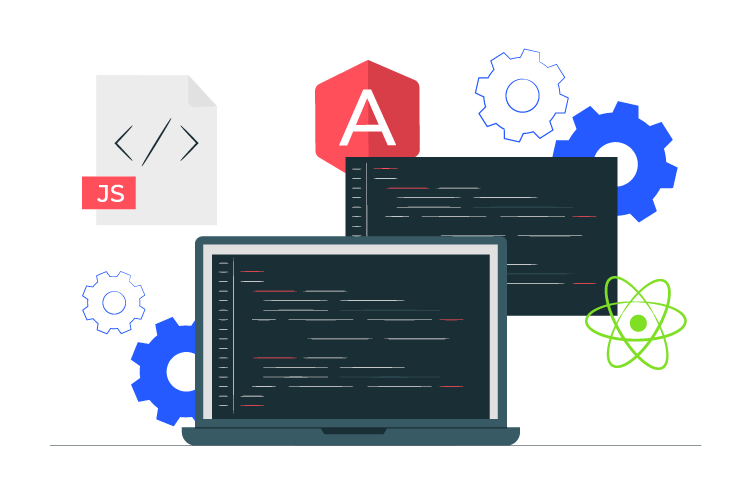Businesses must carve a strong web or mobile presence to accelerate success and enhance profits. Most new enterprises strategies to make marketing effective and align it to their business processes. Despite all the strategies, you might lose a heavy customer base if your product is not good or is sent to the market early.
The right framework is important for developing a robust product and expediting delivery. Angular and ReactJS are two frameworks that are significantly used in front-end development. You can use the in-built libraries and pre-built templates to develop your custom application.
This guide will discuss the top differences between Reactjs and Angularjs. This would help you plan your tech stack for the upcoming app solution.

We have detailed the differences between ReactJS and Angular to help you understand each framework better.
Angular was developed using TypeScript, an open-source and high-end programming language. TypeScript requires a certain learning curve, as it is one of the static languages. It includes an inference type that helps complete the code and improve the debugging of your application. You may need to learn the syntax and type in the right code.
On the other hand, ReactJS was developed using JavaScript programming language. Facebook backs it and uses object-oriented components. As it is back-end by a tech giant and popular in front-end development, it has been designed to make development easy. You can learn the language and create a web solution faster with ReactJS.
When you use Angular, it extends support to two-way data binding. The data can move from the parent to the child component/class. At the same time, it can move from the child component too. This means any aspect of the component is changed, and it can change the entire function or unit.
ReactJS offers one-way data binding. As a result, there is a single directional movement of the data. If you make more object-specific changes, this may only affect some of the classes. You can easily incorporate minor changes without impacting the entire application.
Several developers prefer ReactJS over Angular, as it allows unit changes.
Angular uses incremental DOM. Whenever you add a new DOM, you compare it with the previous DOM. As a result, it occupies the memory as and when needed within an application. However, it would be an actual space whenever it does occupy the memory.
ReactJS uses virtual DOM. You don't occupy the actual memory space for any purpose. Most of the calculations and comparisons are done within the virtual DOM. You will notice greater efficiency in the way it utilises memory.
ReactJs is an excellent framework if you want to improve memory utilisation.
Both Angular and Reactjs enjoy strong community support. You can gear up to connect with people within the community to gain help for coding issues and other problems. For instance, the community will extend the code solutions if you are stuck while applying logic.
However, it is easier to get the community's backing for ReactJS. You have the community from Facebook and its forums as well. ReactJS is loved by 42% of developers, while, ReactJS is loved by 20% (StackOverFlow).
It is important to note that the StackOverFlow survey indicates stronger community support for ReactJS.
When comparing Angular versus ReactJS, you need to check for this factor. Angular extends support for dependency injection. You need to create a separate state for each component. They also need different lifecycles to manage.
ReactJS doesn't work with dependency injection. Each component has a separate global state. This means you don't need to implement the injection for each separate function.
ReactJS can enhance the performance of the application and expedite application development. The developers can easily add functions, enhance the function or improve the development.
Angular JS is a TypeScript-based framework. It is a complete web application development package. You can start working on developing the application from the ground up using the components and syntax from this library. It can be used to create front-end and back-end for the applications. It is an efficient way to build heavy and large-scale applications.
ReactJS is a JavaScript library with pre-built templates and several application components. You can easily build an app with these pre-built solutions. You can even use the code in these libraries to create your application. ReactJS is used to develop the client side of the application. It is not used for back-end development.
Angular is a great framework if you want to build a full-stack application. However, if you want to create a client-side solution, you should use ReactJS. However, if you want to develop a client-side application, you should opt for ReactJS.
The framework's performance is an important factor to consider when planning the tech stack. ReactJS offers exceptional performance against Angular. However, when you look at the Angular 2 framework, they have raised the bar.
You can also integrate with ReactNative or NativeScript to deliver a seamless mobile application for your business needs. This integration can help you deliver more native-like functionality or components. You can enhance the performance of the application with React.
If you want to build a mobile app with either ReactJS or Angular, you should involve another framework or language for the application. You can integrate with Ionic to deliver a robust application. You must use native WebView components to deliver mobile support with either ReactJS or Angular.
The one aspect that enhances the application's performance is the virtual DOM used by ReactJS. You will notice that it helps improve memory usage and optimises the application.
ReactJS is a strong front-end framework that was developed by the Facebook team. It improves web application development. Angular is a slightly convoluted framework that can help developers build front-end and back-end development.
If you want to develop high-end and complex applications, choose Angular. However, you can use Reactjs to create simple and medium-sized complexity applications.
You need a robust web app development partner to ensure smooth app development.